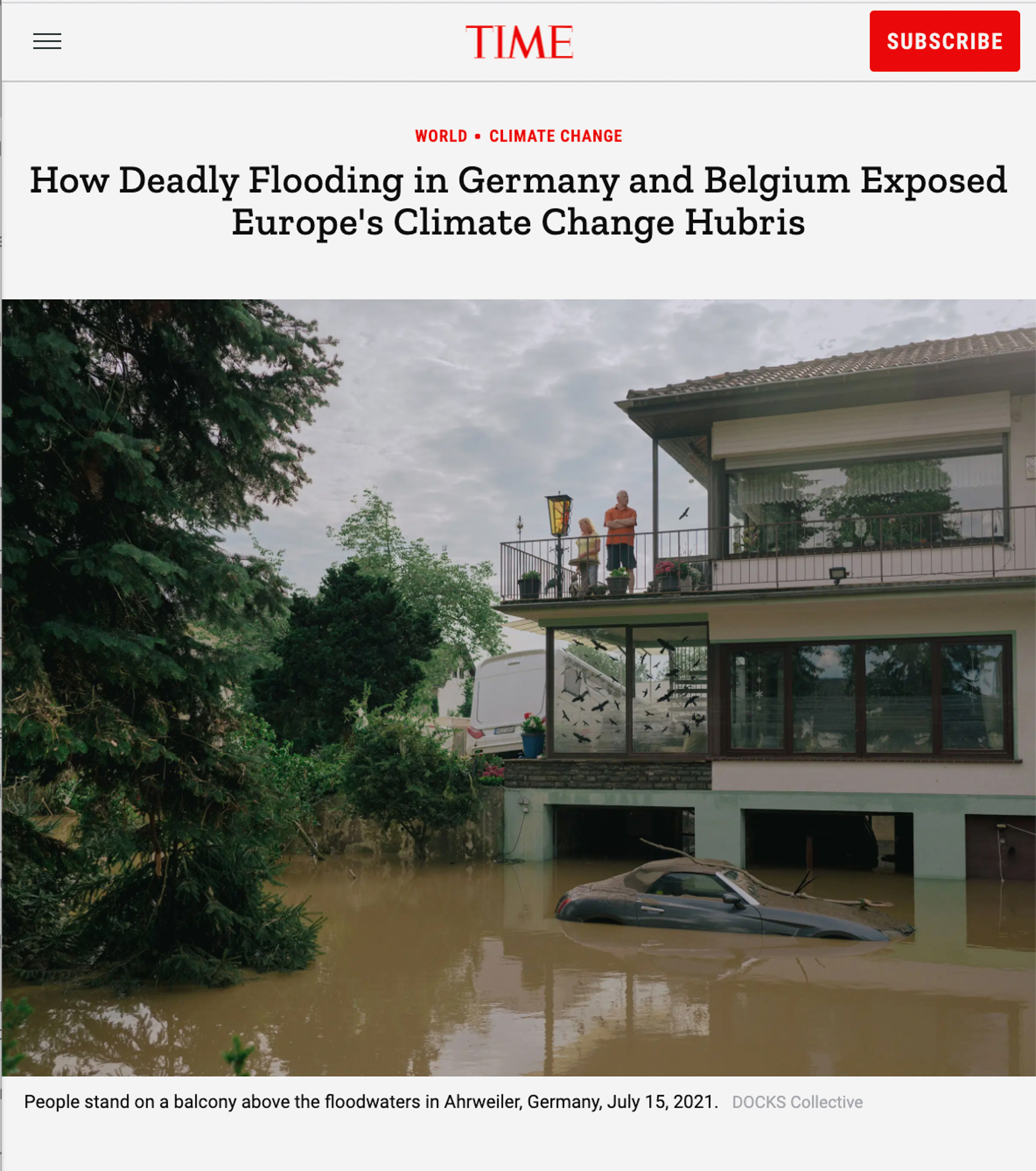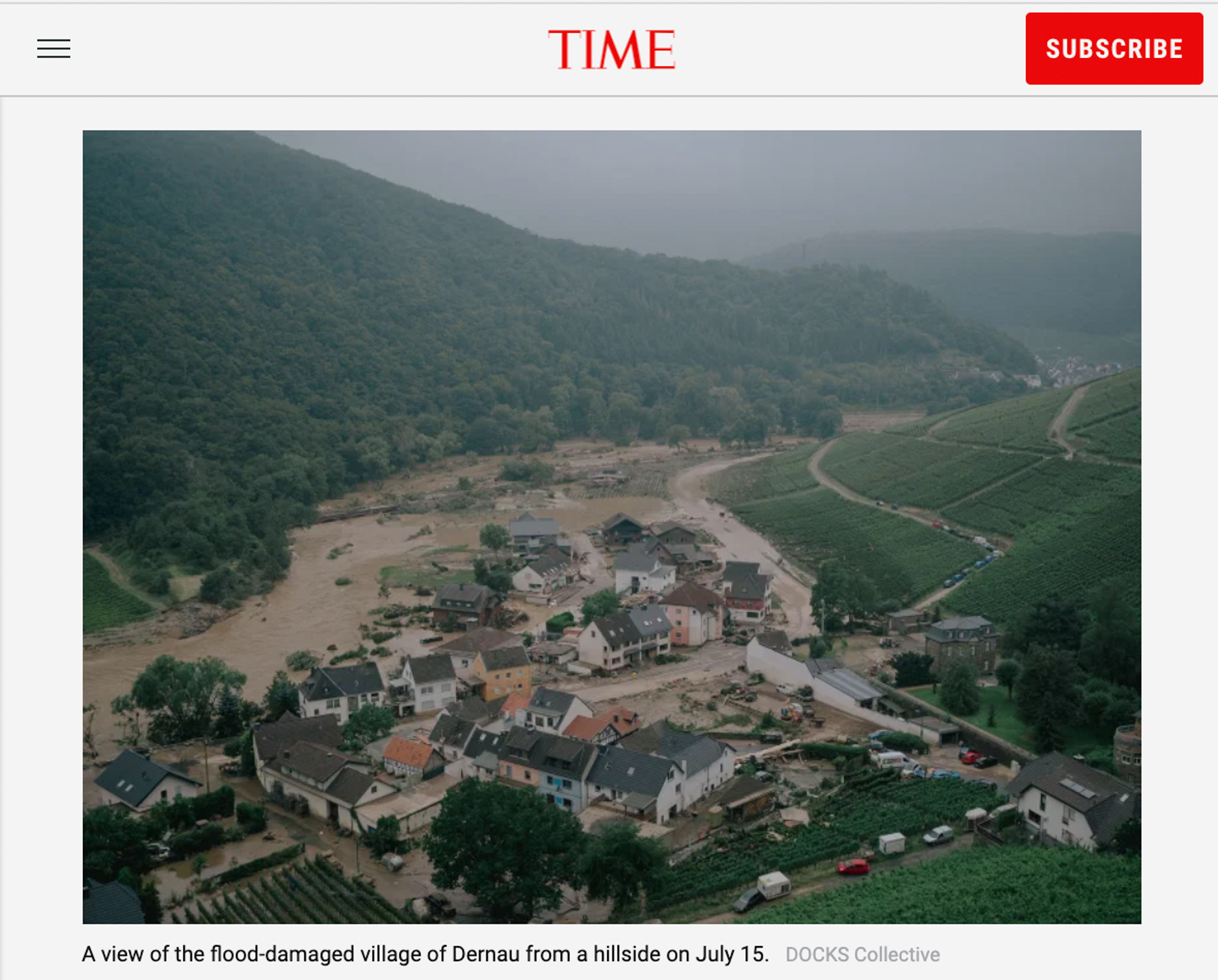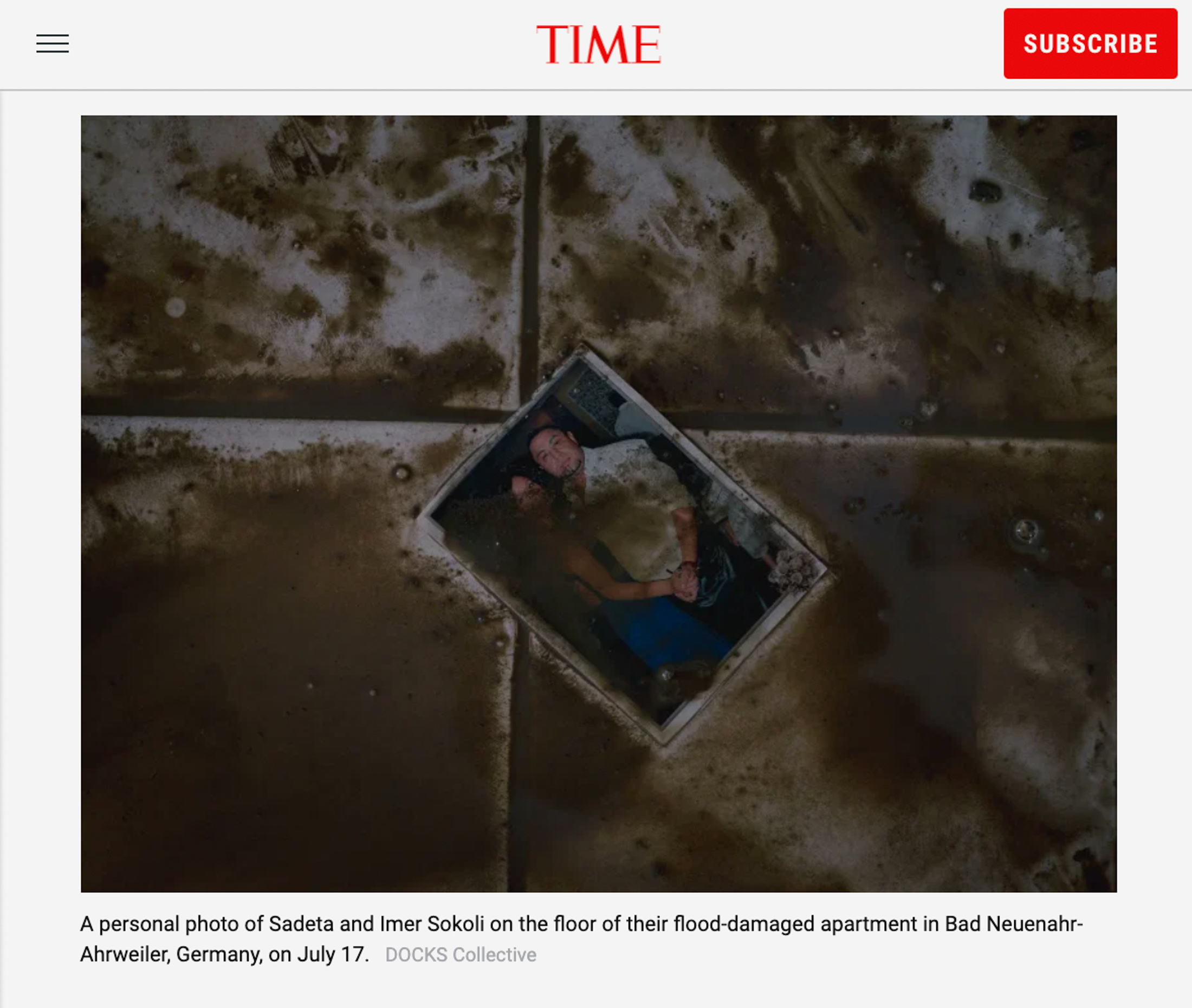A Year Along the Banks, DOCKS COLLECTIVE
2021-2022 A family on the balcony of their house in Ahrweiler. On the first day after the flood, the extent of the destruction was difficult to assess, so there was a disastrous shortage of equipment and emergency personnel in the flooded area. Ahrweiler, July 15, 2021
A family on the balcony of their house in Ahrweiler. On the first day after the flood, the extent of the destruction was difficult to assess, so there was a disastrous shortage of equipment and emergency personnel in the flooded area. Ahrweiler, July 15, 2021 Aerial view of a field on the outskirts of Erftstadt-Blessem. Flooding caused retrograde erosion in a gravel pit that covered about 300 meters. Erftstadt-Blessem, July 16, 2021
Aerial view of a field on the outskirts of Erftstadt-Blessem. Flooding caused retrograde erosion in a gravel pit that covered about 300 meters. Erftstadt-Blessem, July 16, 2021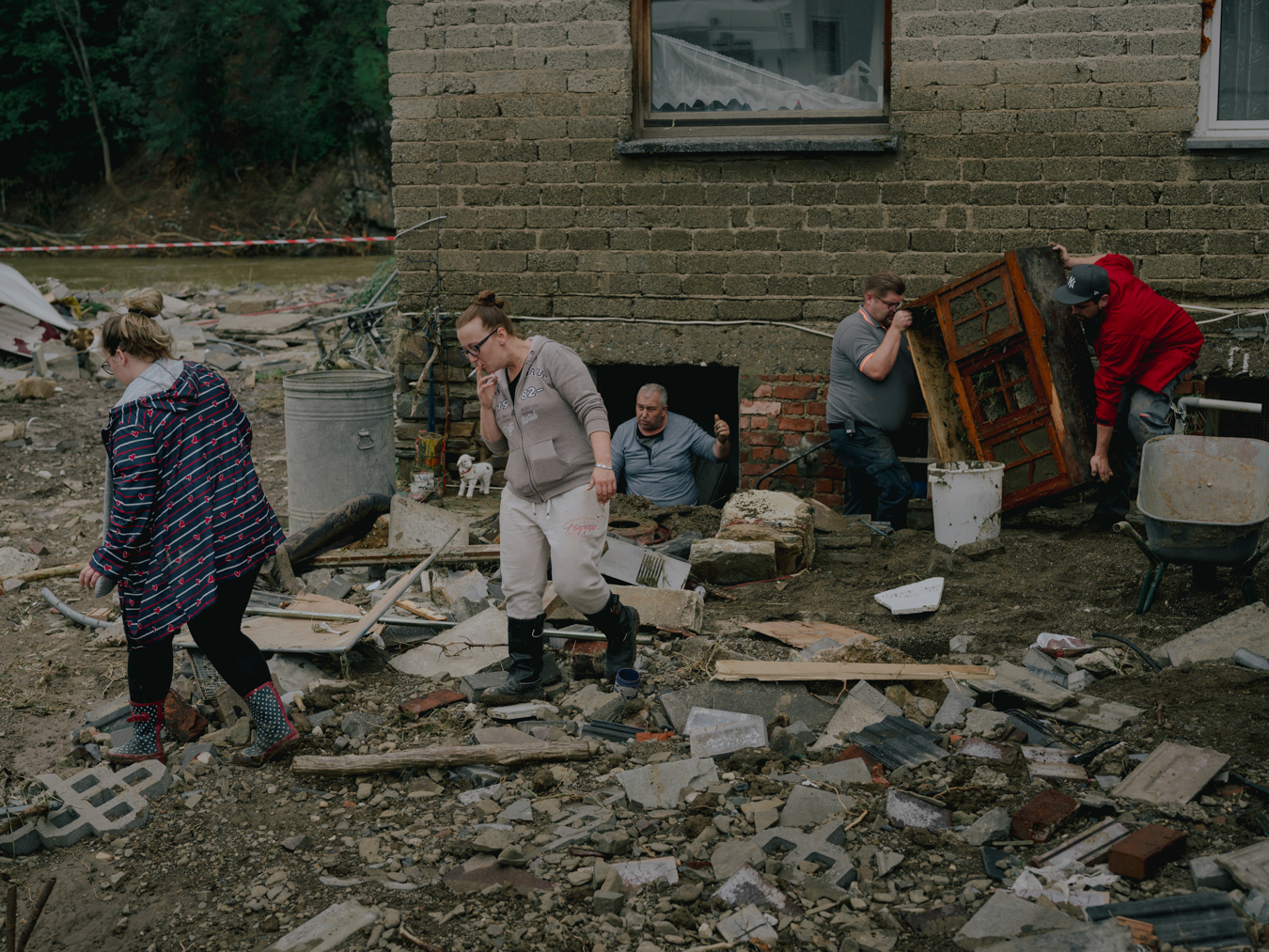 Himmes family cleans up the flooded basement of their house. Before the flood there was a playground and a tennis court in front of their house, now they are only separated from the river by a wasteland. In the first few days, many parts of the village were closed off, and even homeowners were forbidden to go there because of the risk of cave-ins or unexpected voids under the debris. Schuld, July 16, 2021
Himmes family cleans up the flooded basement of their house. Before the flood there was a playground and a tennis court in front of their house, now they are only separated from the river by a wasteland. In the first few days, many parts of the village were closed off, and even homeowners were forbidden to go there because of the risk of cave-ins or unexpected voids under the debris. Schuld, July 16, 2021 Local residents burn debris from their homes at the Hahnenstein Mill in Insul. Many friends came to help the farm community clean up. Insul, July 16, 2021
Local residents burn debris from their homes at the Hahnenstein Mill in Insul. Many friends came to help the farm community clean up. Insul, July 16, 2021
Daniil Taranov (25) poses for a portrait after working for the THW in Altenahr. The building contractor from Groß-Gerau volunteered in the flood area for four days and pumped out the cellar: "I've never seen anything like it. Many citizens just talk and do nothing. But I really want to do something that is my demands on myself ". Altenahr, July 23, 2021
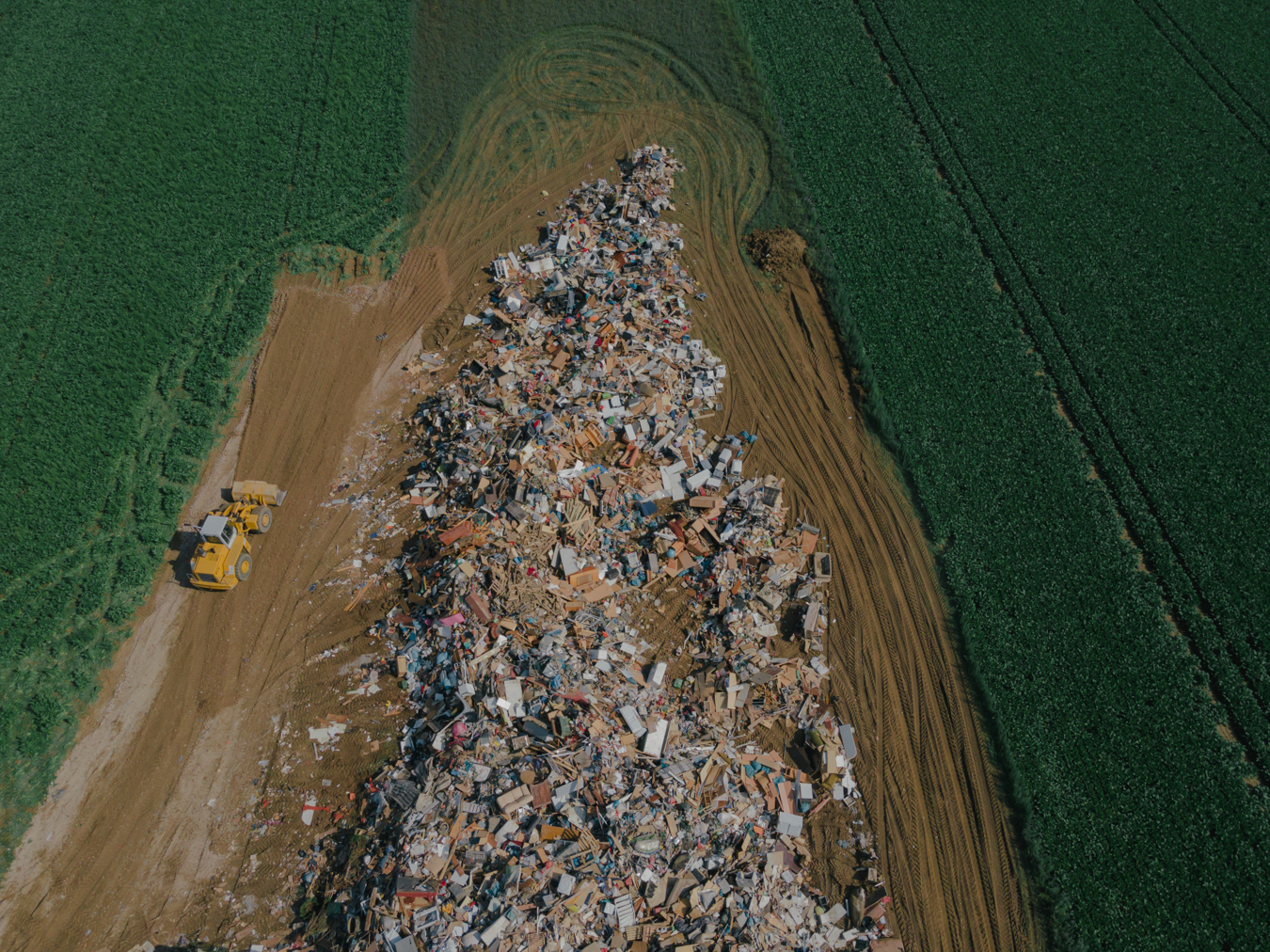 A temporary collection point for trash has been set up in a field in Rheinbach. People line up to unload their destroyed furnishings. Within a short period of time, as much trash was created as would otherwise have been in a year. Waste management companies work at piecework to remove the tens of thousands of tons of trash that have accumulated. Rheinbach, July 17, 2021
A temporary collection point for trash has been set up in a field in Rheinbach. People line up to unload their destroyed furnishings. Within a short period of time, as much trash was created as would otherwise have been in a year. Waste management companies work at piecework to remove the tens of thousands of tons of trash that have accumulated. Rheinbach, July 17, 2021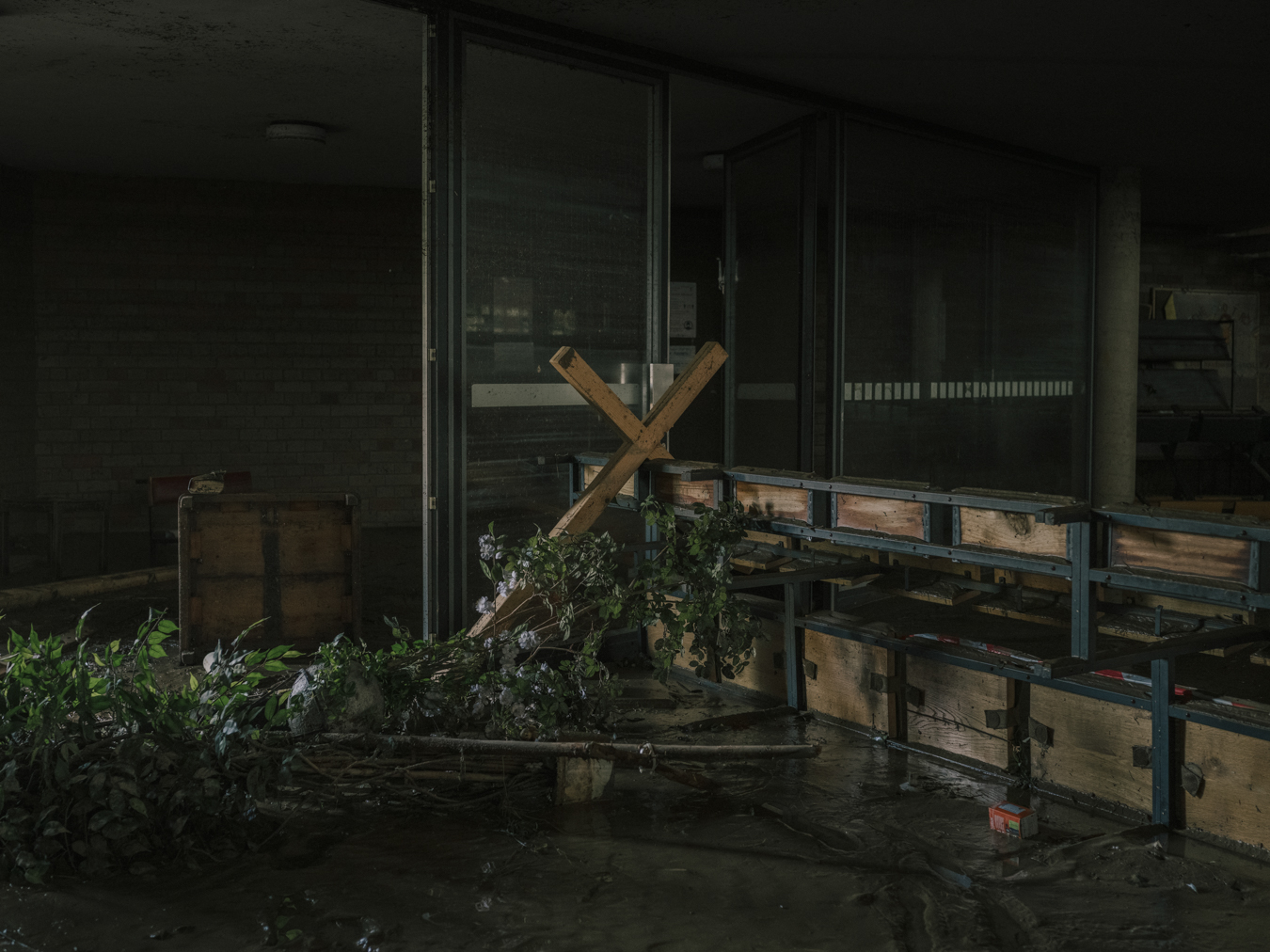 A cross of the Catholic parish church "St. Pius" in Bad Neuenahr-Ahrweiler destroyed by the flood. Ahrweiler, July 17, 2021
A cross of the Catholic parish church "St. Pius" in Bad Neuenahr-Ahrweiler destroyed by the flood. Ahrweiler, July 17, 2021 Ingrid Zarm (81) lost her home in Bad Neuenahr-Ahrweiler, where she had lived for over 20 years. She was already asleep when the flood came, neighbors woke her up and saved her life. Now she is temporarily staying at the Lindner Hotel at the Nürburgring, which takes in evacuees free of charge. "Nature is taking revenge; we have been reckless with our environment for too long," she says. Nürburg, July 17, 2021
Ingrid Zarm (81) lost her home in Bad Neuenahr-Ahrweiler, where she had lived for over 20 years. She was already asleep when the flood came, neighbors woke her up and saved her life. Now she is temporarily staying at the Lindner Hotel at the Nürburgring, which takes in evacuees free of charge. "Nature is taking revenge; we have been reckless with our environment for too long," she says. Nürburg, July 17, 2021 Soldiers from Merzig, Saarland, unload a truck with sleeping bags and beds for the emergency shelters. As part of the administrative assistance, 2000 soldiers are deployed in the affected areas in Rhineland-Palatinate and North Rhine-Westphalia. Nürburgring, July 17, 2021
Soldiers from Merzig, Saarland, unload a truck with sleeping bags and beds for the emergency shelters. As part of the administrative assistance, 2000 soldiers are deployed in the affected areas in Rhineland-Palatinate and North Rhine-Westphalia. Nürburgring, July 17, 2021 Family photo of Sadeta and Imer Sokoli on the floor of their apartment in Bad Neuenahr-Ahrweiler. They were temporarily living with their two children in the Lindner Hotel at the Nürburgring, which the owners had made available as emergency accommodation. It was not until the third day after the flood that they were able to enter their apartment and see the extent of the destruction. Bad Neuenahr-Ahrweiler, July 17, 2021
Family photo of Sadeta and Imer Sokoli on the floor of their apartment in Bad Neuenahr-Ahrweiler. They were temporarily living with their two children in the Lindner Hotel at the Nürburgring, which the owners had made available as emergency accommodation. It was not until the third day after the flood that they were able to enter their apartment and see the extent of the destruction. Bad Neuenahr-Ahrweiler, July 17, 2021 The village of Dernau in the Ahr Valley on the first night after the flood. Rescue workers search for survivors with boats. On the first day after the disaster, the water in Dernau was still high, leaving some people locked in their homes without electricity or mobile reception and with no way to call for help. Some lingered on their rooftops, sending SOS signals into the night with cell phones and flashlights. Dernau, July 15, 2021
The village of Dernau in the Ahr Valley on the first night after the flood. Rescue workers search for survivors with boats. On the first day after the disaster, the water in Dernau was still high, leaving some people locked in their homes without electricity or mobile reception and with no way to call for help. Some lingered on their rooftops, sending SOS signals into the night with cell phones and flashlights. Dernau, July 15, 2021 Emergency chaplain Albi Roebke poses for a portrait after a memorial service for flood victims at the Namen Jesu Church in Bonn. "We live in a society that believes it can control nature. And now people feel powerless. We have to be afraid of water and fire again, like our ancestors 40,000 years ago," he says. Emergency chaplains are working around the clock in affected areas, providing trauma prevention. "We try to show those affected that they can still be capable of action in times of powerlessness." Bonn, July 18, 2021
Emergency chaplain Albi Roebke poses for a portrait after a memorial service for flood victims at the Namen Jesu Church in Bonn. "We live in a society that believes it can control nature. And now people feel powerless. We have to be afraid of water and fire again, like our ancestors 40,000 years ago," he says. Emergency chaplains are working around the clock in affected areas, providing trauma prevention. "We try to show those affected that they can still be capable of action in times of powerlessness." Bonn, July 18, 2021 A clothing store in the center of Euskirchen. Many
A clothing store in the center of Euskirchen. Many stores in the city center were destroyed, the water was up to three meters high. Euskirchen, July 16, 2021
 Volunteer firefighters from Fettelschoss take a break in Bad Neuenahr-Ahrweiler. Christian Lehmann (41), second from left, has been with the volunteer fire department for more than 20 years and has never encountered a situation like this. "You can't let yourself take what happened personally and just have to do your job," he says. Bad Neuenahr-Arweiler, July 17, 2021
Volunteer firefighters from Fettelschoss take a break in Bad Neuenahr-Ahrweiler. Christian Lehmann (41), second from left, has been with the volunteer fire department for more than 20 years and has never encountered a situation like this. "You can't let yourself take what happened personally and just have to do your job," he says. Bad Neuenahr-Arweiler, July 17, 2021 The village of Altenahr was considered a popular tourist destination before the flood disaster, now many hoteliers and restaurateurs fear for their existence, most people in the village live directly or indirectly from tourism. On the evening of June 14, the tide gauge was swept away by the floods at a level of 5.7 meters. Experts estimate the flood level during the night to be over 7 meters. Altenahr, July 22, 2021
The village of Altenahr was considered a popular tourist destination before the flood disaster, now many hoteliers and restaurateurs fear for their existence, most people in the village live directly or indirectly from tourism. On the evening of June 14, the tide gauge was swept away by the floods at a level of 5.7 meters. Experts estimate the flood level during the night to be over 7 meters. Altenahr, July 22, 2021 Mortician Ferdinand Pfahl is responsible for the victims of the flood disaster in the districts of Bonn, Rhein-Sieg and Euskirchen. More than 30 deceased people were transported by his employees to his funeral home in Bonn. Since the people did not die of natural causes, they are being examined in the forensic medicine department in Cologne. In some cases, the bodies had to be stacked on top of each other in the transport wagon. Ferdinand Pfahl also lost an employee. Bonn, July 20, 2021
Mortician Ferdinand Pfahl is responsible for the victims of the flood disaster in the districts of Bonn, Rhein-Sieg and Euskirchen. More than 30 deceased people were transported by his employees to his funeral home in Bonn. Since the people did not die of natural causes, they are being examined in the forensic medicine department in Cologne. In some cases, the bodies had to be stacked on top of each other in the transport wagon. Ferdinand Pfahl also lost an employee. Bonn, July 20, 2021 A donation collection point at the Nürburgring. Hundreds of volunteers have come forward to sort the incoming donations for the flood victims. The huge halls are filled with donations in no time. Nürburg, July 16, 2021
A donation collection point at the Nürburgring. Hundreds of volunteers have come forward to sort the incoming donations for the flood victims. The huge halls are filled with donations in no time. Nürburg, July 16, 2021 Parts of the annex of the historic "Blessem Castle" on the outskirts of Erftstadt-Blessem have been destroyed due to rapid and massive erosion. Erftstadt-Blessem, July 16, 2021
Parts of the annex of the historic "Blessem Castle" on the outskirts of Erftstadt-Blessem have been destroyed due to rapid and massive erosion. Erftstadt-Blessem, July 16, 2021 A statue of the Virgin Mary in the devastated cemetery of Altenahr. Numerous volunteers as well as police officers clean up the destroyed and completely mud flooded cemetery. Altenahr, July 21, 2021
A statue of the Virgin Mary in the devastated cemetery of Altenahr. Numerous volunteers as well as police officers clean up the destroyed and completely mud flooded cemetery. Altenahr, July 21, 2021 Sadeta and Imer Sokoli clean up their apartment after the flood. The water had risen 80 centimetres on the second floor, so they spent the night of the flood with their neighbours on the floor above. Even though many of the items are still okay on the outside, most of it had to be thrown away. Sadeta and Imer fled from Kosovo to Germany more than 20 years ago independently of each other, started their family here and raised two children. Bad Neuenahr-Ahrweiler, July 17, 2021
Sadeta and Imer Sokoli clean up their apartment after the flood. The water had risen 80 centimetres on the second floor, so they spent the night of the flood with their neighbours on the floor above. Even though many of the items are still okay on the outside, most of it had to be thrown away. Sadeta and Imer fled from Kosovo to Germany more than 20 years ago independently of each other, started their family here and raised two children. Bad Neuenahr-Ahrweiler, July 17, 2021 Part of the historic Ahr bridge in Rech was destroyed, so the Bundeswehr transported residents as well as helpers with boats to the other bank. Next to the damaged bridge, an armored bridge was erected to allow vehicles to cross. Rech was cut off from the outside world for several days. Rech, July 22, 2021
Part of the historic Ahr bridge in Rech was destroyed, so the Bundeswehr transported residents as well as helpers with boats to the other bank. Next to the damaged bridge, an armored bridge was erected to allow vehicles to cross. Rech was cut off from the outside world for several days. Rech, July 22, 2021 The devastated bathroom of Julian and Jessica Kay in the village of Altenahr. Their entire home was flooded over 2 floors, they took refuge in the attic and then, together with their dog and cat, over a self-made footbridge onto the neighbouring hotel balcony. The hotel owner ripped a door off its hinges to use it to build a makeshift bridge for them. In the neighboring house lived Jessica's parents, who could not be saved. They had to watch how first the facade was torn away and then the whole house collapsed. During the night of the flood, they did not receive any timely help via the emergency call, they described the dramatic situation again and again, but nobody came. Altenahr, July 21, 2021
The devastated bathroom of Julian and Jessica Kay in the village of Altenahr. Their entire home was flooded over 2 floors, they took refuge in the attic and then, together with their dog and cat, over a self-made footbridge onto the neighbouring hotel balcony. The hotel owner ripped a door off its hinges to use it to build a makeshift bridge for them. In the neighboring house lived Jessica's parents, who could not be saved. They had to watch how first the facade was torn away and then the whole house collapsed. During the night of the flood, they did not receive any timely help via the emergency call, they described the dramatic situation again and again, but nobody came. Altenahr, July 21, 2021 A tanker truck in a hole in the ground on the premises of the Torwesten forwarding company in Essen. The Deilbach had turned into a raging river and washed away large parts of the soil. The German Armed Forces are providing a temporary bridge to ensure that the forwarding company's work can continue. The forwarding company also delivers drinking water to the flooded areas. Essen, July 20, 2021
A tanker truck in a hole in the ground on the premises of the Torwesten forwarding company in Essen. The Deilbach had turned into a raging river and washed away large parts of the soil. The German Armed Forces are providing a temporary bridge to ensure that the forwarding company's work can continue. The forwarding company also delivers drinking water to the flooded areas. Essen, July 20, 2021 Numerous donations of clothing for flood victims are collected at Maria Verkündung Catholic Parish Church in Altenahr. The local youth distributes food and drinks, going from house to house to feed the numerous helpers. Additional supply stations have been set up by volunteers in front of the town hall and in front of the rectory. Numerous chaplains are also on site to care for the people. Altenahr, July 21, 2021
Numerous donations of clothing for flood victims are collected at Maria Verkündung Catholic Parish Church in Altenahr. The local youth distributes food and drinks, going from house to house to feed the numerous helpers. Additional supply stations have been set up by volunteers in front of the town hall and in front of the rectory. Numerous chaplains are also on site to care for the people. Altenahr, July 21, 2021 Julia Lähn (22) traveled alone from the Baltic Sea to help with the cleanup. A "helper shuttle service" was organized in Grafschaft-Ringen. From there, volunteers are brought to the flood-affected areas. Julia Lähn helped in Ahrweiler, Dernau and Mayschoss. The social education assistant used her vacation for this purpose. Grafschaft-Ringen, July 21, 2021
Julia Lähn (22) traveled alone from the Baltic Sea to help with the cleanup. A "helper shuttle service" was organized in Grafschaft-Ringen. From there, volunteers are brought to the flood-affected areas. Julia Lähn helped in Ahrweiler, Dernau and Mayschoss. The social education assistant used her vacation for this purpose. Grafschaft-Ringen, July 21, 2021 Mayschoss was almost cut off from the outside world. In the first few days, people were evacuated by helicopter. Many material and drinking water deliveries also continued to be made by air. A temporary helipad was set up for this purpose. Mayschoss, July 22, 2021
Mayschoss was almost cut off from the outside world. In the first few days, people were evacuated by helicopter. Many material and drinking water deliveries also continued to be made by air. A temporary helipad was set up for this purpose. Mayschoss, July 22, 2021 Volunteers during the so called "bottle rescue" in a warehouse of the Mayschoss winegrowers' cooperative. The bottles salvaged from the rubble and sodden cartons are cleaned and sold as "flood wine". The winegrowers' cooperative, founded in 1868, produces an average of 1.2 million bottles of wine annually. Mayschoss, August 07, 2021
Volunteers during the so called "bottle rescue" in a warehouse of the Mayschoss winegrowers' cooperative. The bottles salvaged from the rubble and sodden cartons are cleaned and sold as "flood wine". The winegrowers' cooperative, founded in 1868, produces an average of 1.2 million bottles of wine annually. Mayschoss, August 07, 2021 Franz-Josef Graf plays for helpers who are rebuilding a children's playground. The "trumpeter of the Ahr valley," as he is often called, wants to convey courage and confidence to residents and helpers with his music. He travels time and again from Freiwing near Munich to the flood area. Heimersheim, September 04, 2021
Franz-Josef Graf plays for helpers who are rebuilding a children's playground. The "trumpeter of the Ahr valley," as he is often called, wants to convey courage and confidence to residents and helpers with his music. He travels time and again from Freiwing near Munich to the flood area. Heimersheim, September 04, 2021 In the analysis center for damaged money at the Bundesbank headquarters in Mainz, the money of flood victims is dried, counted and checked for authenticity. It is then returned. The Bundesbank provides this service free of charge to those affected. Due to the high demand, the Bundesbank has retrained and called in numerous employees from other departments. Mainz, September 09, 2021
In the analysis center for damaged money at the Bundesbank headquarters in Mainz, the money of flood victims is dried, counted and checked for authenticity. It is then returned. The Bundesbank provides this service free of charge to those affected. Due to the high demand, the Bundesbank has retrained and called in numerous employees from other departments. Mainz, September 09, 2021 Helpers from all over the Federal Republic gather almost daily around a campfire in front of the "Kalenborner Höhe" hotel in Kalenborn. Here, hotelier Alexander Zimmermann built a container village where helpers can stay overnight free of charge. Kalenborn, September 04, 2021
Helpers from all over the Federal Republic gather almost daily around a campfire in front of the "Kalenborner Höhe" hotel in Kalenborn. Here, hotelier Alexander Zimmermann built a container village where helpers can stay overnight free of charge. Kalenborn, September 04, 2021A Year Along the Banks – DOCKS Collective project
Between Tuesday, July 13, and Thursday, July 15, 2021, more than about twice the amount of rainfall expected for the entire month of July fell in parts of the western German states of Rhineland-Palatinate and North Rhine-Westphalia - causing major rivers to burst their banks and sweep away entire villages.
Studies will need to be done to determine whether or not these floods would have taken place without climate change. But scientists say it is safe to assume that it wouldn’t have rained so much, for so long, without the warming of the planet. Warmer air can hold more moisture and Germany’s average temperature has risen by more than 2°C over pre-industrial times.
The effects of climate change, which for people in Central Europe only had an impact on faraway countries, has now also arrived in Germany.
Joint project of Arne Piepke, Maximlian Mann, Aliona Kardash, Fabian Ritter and Ingmar Björn Nolting
Publications:
ZEIT MAGAZIN (October 14, 2021)









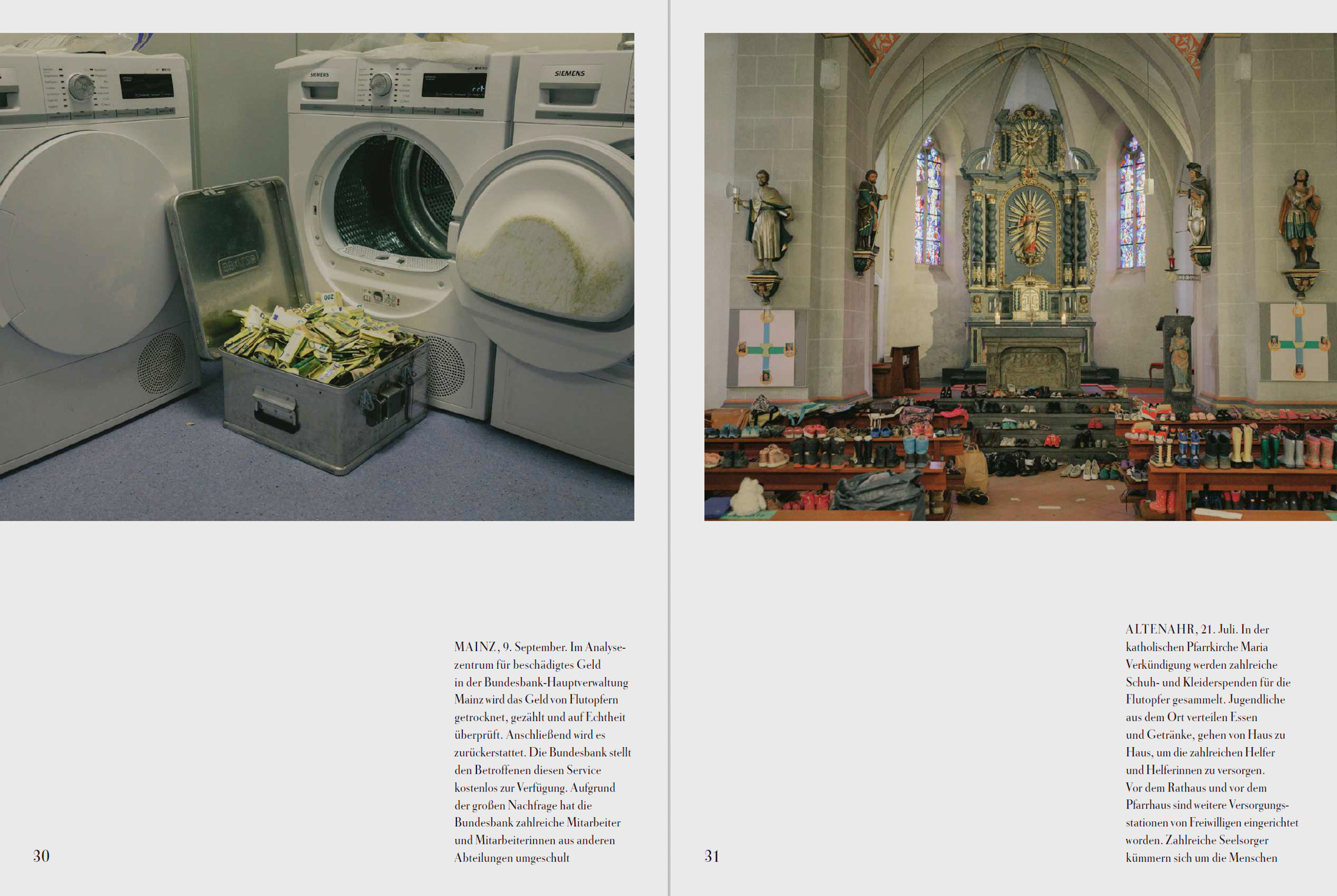


DIE ZEIT (July 22, 2021)
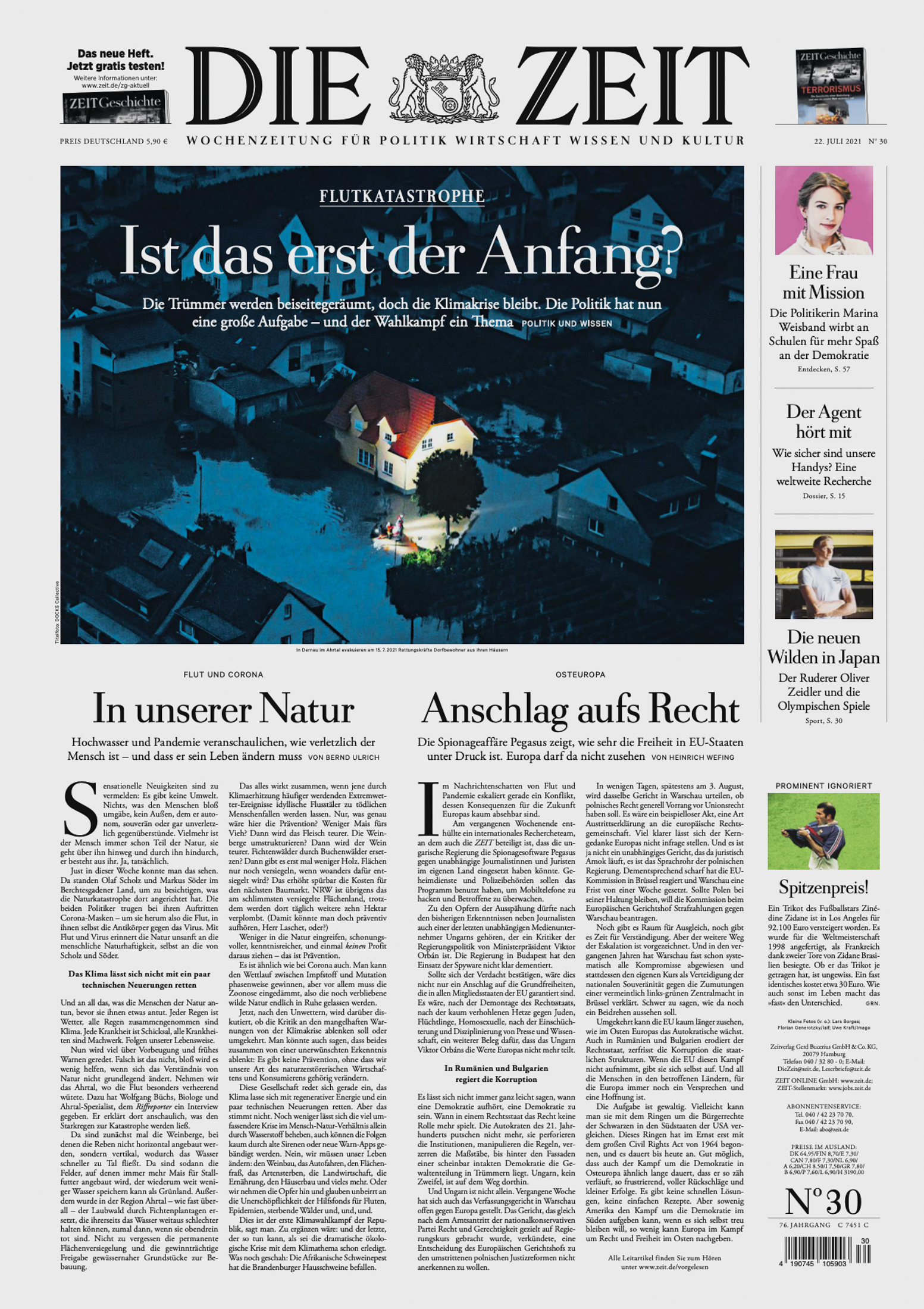
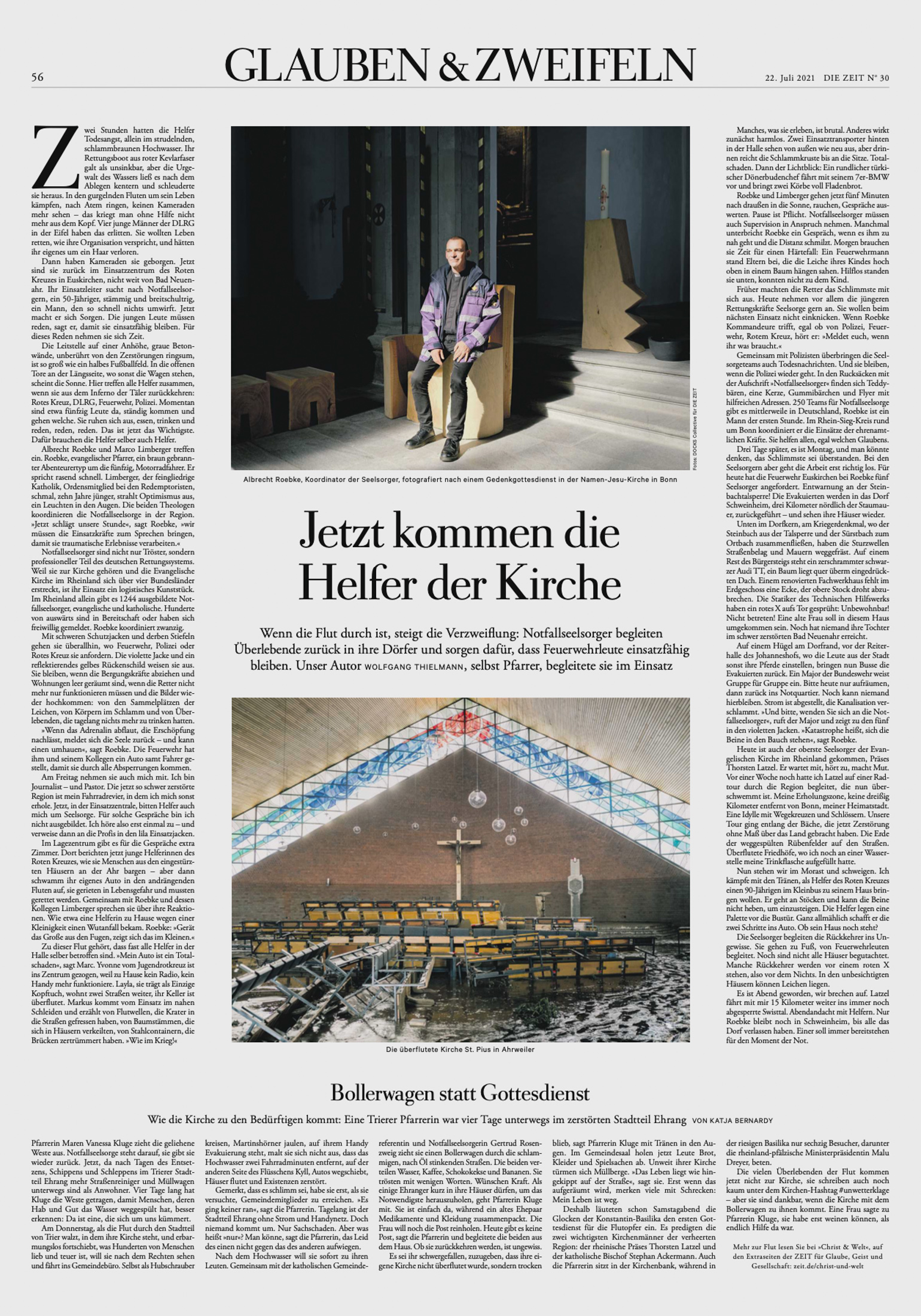
TIME Magazine (July 19, 2021)


TIME Magazine online

